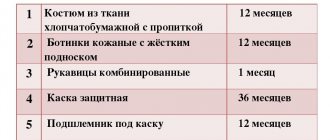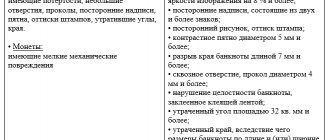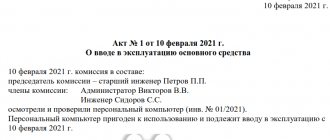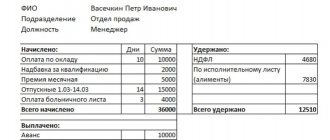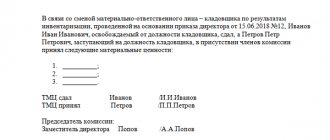It would seem that soap and various disinfectants are a trifle in comparison with other issues of conducting the economic activities of an enterprise. However, the labor inspectorate may impose a fine on the company's management if the personnel documents do not mention the standard for issuing soap to employees. This year, it has become easier to understand the procedure for issuing soap due to the fact that regulations have appeared regulating the procedure for providing soap to employees. We invite you to understand the innovations and also consider the issues of justifying the issuance of soap, reflecting the costs of its purchase, as well as the right of certain categories of workers to receive skin protection products.
Standard for issuing soap to employees
Issues related to the mandatory provision of soap and disinfectants to certain categories of employees are regulated by Order of the Ministry of Health of the Russian Federation dated December 17, 2010 No. 1122n. This document was recently amended in accordance with Order of the Ministry of Labor of the Russian Federation dated November 23, 2017 No. 805n, which entered into force on June 12, 2021.
Before this Order came into force (i.e. until 06/11/2021 inclusive), in the text of an individual employment contract with an employee dealing with harmful factors of production, it was necessary, among other things, to also prescribe the norm for issuing flushing and neutralizing agents to this employee ( or dermatological personal protective equipment - DSPE) based on the requirements of clause 9 of Appendix No. 2 to Order of the Ministry of Labor of the Russian Federation No. 1122n.
At present, it is not necessary to prescribe such a clause in the contract - the norm for issuing soap to employees can be enshrined in the internal act of the company
(see subparagraph “a”, paragraph 1 of Order No. 805n). In this case, it is necessary to familiarize the staff with the approved standards (you can choose any method - written notification, electronic message - the main thing is that the management has confirmation of the fact that the employees were familiar with the established standards).
As before, the issuance of dermatological personal protective equipment must be reflected in the employee’s personal card against his/her signature. But after amendments are made to the Order of the Ministry of Health of the Russian Federation, in some cases this action may not be carried out. Thus, the issuance of soap and other products may not be recorded in a personal card if the staff encounters contamination that can be easily eliminated.
The company distributes soap and disinfectants after the results of a special assessment of working conditions become known. In this case, the Standard Standards, which are approved by Order No. 1122, are taken into account.
Important!
In the event that a special assessment has not yet been carried out at the enterprise, and the personnel perform job duties named in the text of the Standard Standards of Order No. 1122, the employees must be provided with flushing and neutralizing means. Otherwise, the situation of workers will worsen when compared with legal norms (see Letter of the Ministry of Labor of the Russian Federation dated April 29, 2016 No. 15-2/OOG-1698).
Professions and DSPE standards
Rinsing and similar substances applied to the skin (dermatological) are classified by the occupational safety service as personal protective equipment for workers - PPE. Order No. 1122n contains a list of personal protective equipment by category, indicating fixed issuance rates calculated per month of consumption.
How to establish standards for issuing cleaning agents and disinfectants (soap) to employees?
Protective in nature
Moisturizing skin - for persons in contact with oils, greases, soot, solvents, petroleum products, industrial dust and similar media that are not soluble in water (100 ml).
Water-repellent, drying the skin to a natural state, for persons in contact with water, soap-water solutions, cement solutions containing salt, acid, alkali, etc.; working in gloves without lining, made of ordinary rubber (100 ml).
Labor experts know cases where large fines have been imposed on an employer, for example, for failure to specify the standards for dispensing soap in an employment contract. See what responsibility
Combining the above characteristics, combined. If you have to work with substances that change the condition of the skin, then dry the skin or moisturize it (100 ml).
Prevents irritation and damage to the skin - when welding, working in windy, cold conditions (100 ml).
Disinfectants - in case of contact with substances containing dangerous bacteria or that may contain them, the absence of sanitary and hygienic premises at the place of work or in the vicinity of it, if the work requires highly sterile hands. This also includes working in safety shoes (200 ml).
Cleansing character
When working with contaminants that are easily washed off, the standard for hand washing will be 200 g of toilet soap (250 ml - liquid, in a container with a dispenser), for the body, respectively, 300 g and 500 ml.
When working with contaminants that are difficult to wash off, namely oils, greases, petroleum products, paint and varnish industry, industrial dust and other persistent contaminants - 300 g of toilet soap (500 ml in a container with a liquid dispenser).
Mine work, in the field of mine construction and installation, in the production industry - 800 g and 750 ml, respectively.
Restorative in nature
Creams, emulsions - when working with solvents and other aggressive, skin-corroding environments, work with which is carried out in thin, unlined gloves. – 100 ml.
On a note. There is no concept of “easily washable pollution” in legislative acts. There is a document of the Ministry of Labor (letter) No. 15-2/B-2039 dated June 23, 2021. It includes hair and skin contamination obtained at work as easily washable if it can be easily removed with soap or liquid soap.
Based on the above standards, departments develop their own documents, which include lists of professions and standards for issuing personal protective equipment for each profession. Thus, JSC Russian Railways applies “Recommendations for the use of cleaning agents and disinfectants...”. The document contains a structured list of personal protective equipment for Russian Railways and a list of professions, for each of which it is indicated which personal protective equipment is required for skin protection, cleaning, regeneration and whether it is required.
Since there is no single list of professions, you can use this document as a guideline, and specific indicators for professions established in the company can be reflected in local documentation.
On a note. The organization is not obliged to issue soap in the office to employees and formalize this procedure (see Letter No. 15-2/OOG-1752 dated May 6, 2021, Ministry of Labor).
Organization of accounting for the issuance of soap and disinfectants
If a company organizes the accounting of dermatological personal protective equipment on its own, it is necessary to take into account the norms of current legislation and the following circumstances:
- Order No. 805n abolished the obligation of managers to record the distribution of soap to employees in personal accounting cards in cases where employees are engaged in work with easily washable contaminants.
- In accounting, soap and other similar products are inventories and are subject to accounting according to established inventory accounting standards, without any special features.
- A sample of a personal soap accounting card can be found in the appendix to Order No. 1122n.
- The company must approve a list of professions whose employees should receive soap and disinfectants. The list can be drawn up by order as an annex to the collective agreement.
- It makes sense to develop a standard for issuing personal protective equipment for production areas and approve standards for controlling consumption in the company's divisions. On the back of the document there should be a list of soap dispensed to the site - the signature of the responsible person will be affixed here.
Order for issuing detergents: sample
Sample order for standards for issuing workwear
Each employer must keep records of the distribution of flushing and protective equipment. Such accounting is carried out using personal cards of workers. They indicate the employee’s name, position, as well as a list of items issued. In most cases, such cards are quite enough. There is no need to draw up a special order for extradition.
However, if necessary, such an order can be drawn up. It indicates the list of employees to whom the issuance is carried out, as well as all funds. The order is signed by the manager or responsible person. The employees themselves do not have to sign for it.
Sample order for extradition
How to familiarize employees with the company’s standard for dispensing soap
When the company has drawn up a local regulatory act containing information on the norm for issuing flushing and neutralizing agents, the document must be familiarized to the employees who will be affected by the innovations. If new employees are hired by a company, they are introduced to the act during employment, before signing an employment contract.
If an employee is already employed by the company, you need to inform him about changes in the process of performing work duties (for example, when transferring to another position that involves receiving free soap).
The Labor Code of the Russian Federation contains a requirement for employees to familiarize themselves with the acts against signature - see paragraph. 10 hours 2 tbsp. 22 Labor Code of the Russian Federation. As a general rule, internal regulations of the company are brought to the attention of workers also against signature - see Art. 68 Labor Code of the Russian Federation. The employer needs to draw up a familiarization sheet and attach it to the local act - on this sheet employees will put the date of familiarization with the document and their personal signature
.
When an employee’s signature is available, the employer can always defend itself in court if the employee has any claims in the future. But it should be noted that firms were allowed to notify employees about changes in the company’s internal regulations in electronic form - by sending a message by email
. Undoubtedly, sending an electronic message is much more convenient and faster than drawing up a familiarization sheet and asking the worker to sign it. However, it should be borne in mind that it is in the case of providing soap and other means that complaints may arise from the staff - simply because cleaners and janitors rarely use the Internet in their work.
If it was decided to send a notification about the need to familiarize yourself with the standards for issuing soap by email, you should obtain evidence that the employee read the message. The supporting document may be a printout of the email that was successfully sent to the employee
, confirmation that the employee logged into the company’s internal information system using a personal login and password, etc.
Amounts of possible fines
According to the current edition of Part 3 of Art. 5.27 of the Code of Administrative Offenses of the Russian Federation, for improper execution of an employment contract with an employee (including regarding issues of sanitary and household services), the employer may receive not-so-small fines:
- from 10,000 to 20,000 rub. - for officials;
- from 5,000 to 10,000 rubles. — for persons carrying out entrepreneurial activities without forming a legal entity;
- from 50,000 to 100,000 rub. - for legal entities.
Common mistakes
Error:
The company did not conduct a special assessment of working conditions, and therefore the standard for issuing soap to employees was not approved by management. Therefore, employees do not receive cleaning agents and disinfectants at the enterprise, although the type of activity is listed in the text of the Standard Standards of Order of the Ministry of Labor dated December 17, 2010 No. 1122.
A comment:
Even if a specific workplace assessment has not been carried out, it is necessary to provide employees with soap and other supplies if they are performing work that requires the provision of flushing and disinfecting protective equipment.
Error:
The accountant and HR staff were not provided with free soap at the employer's premises.
A comment:
Despite the fact that accountants and personnel employees do not encounter pollution when performing their work duties, in the Letter of the Ministry of Labor of the Russian Federation dated August 30, 2016 No. 15-2/ОOG-3095 and in the Letter of the Ministry of Labor of the Russian Federation dated May 6, 2016 No. 15-2/ОГ -1752 states the need to provide them with soap for hygienic purposes (solid soap or a dispenser with liquid soap in sanitary facilities will be sufficient).
Office
Accountants and other office employees are not required to issue soap on the basis of the above-mentioned Order of the Ministry of Health and Social Welfare. The Ministry of Labor came to this conclusion in letter No. 15-2/OOG-1752 dated May 6, 2016.
At the same time, the employer is obliged to provide the household needs of all employees of the organization and equip sanitary facilities with everything necessary (including soap).
Let us note that the legislation does not establish a specific list of what relates to household needs. Rostrud believes that the employer is obliged to provide workers with toilet paper, towels, and soap.
Source:
"Clerk"
Heading:
Occupational Safety and Health
labor protection soap distribution
- Inna Kosnova, Clerk columnist, accounting and taxation expert
Sign up 6825
9750 ₽
–30%
Answers to common questions about what is the standard for issuing soap to employees
Question #1:
Can the standard for issuing soap to employees be approved by the employer at his own discretion?
Answer:
Yes, the standard for issuing soap to employees can be approved by the management of the enterprise. However, the established standards for the free issuance of funds should increase the protection of personnel, and not worsen the situation of workers in comparison with the Standard Standards.
Question #2:
An employee who handles contaminants while performing his or her job is not employed full-time. How should the rate of soap distribution to employees be calculated in this case?
Answer:
It is necessary to provide soap and disinfectants in proportion to the employee’s time of employment. If, for example, a full-time employee (performing similar job functions) is supposed to be given 500 grams of free soap per month, then a part-time employee should be given 250 grams of soap. See Letter of the Ministry of Labor of the Russian Federation dated September 29, 2016 No. 15-2/OOG-3452.
How to determine what funds are needed and their quantity
Determining the required type and quantity of rinsing agents
Each enterprise has its own procedures for issuing products for washing away impurities and regenerating the skin, but if you have doubts about the organization of this area, you can use a simple but effective algorithm:
- To begin with, it is worth carefully studying the legislative framework, and then the existing regulatory documents adopted at the Federal level. This is entrusted to the labor protection department at the enterprise.
- Ideally, for each workplace in organizations, a special assessment of working conditions should be carried out, that is, certification cards should be issued. The documents must indicate how much flushable products are provided to workers and for what period. This is determined by the experts involved in the matter.
Further, there are two options for issuing funds:
- as a result of a special assessment;
- established standards.
It turns out that if there are no certification cards, then it is necessary to be guided by standard standards.
So, now for each profession there is material on providing workers with means for washing and disinfecting the skin.
Principles for determining standards for detergents for kindergartens and schools
Just as in all organizations, standards for the consumption of detergents in budgetary institutions are independently developed and approved by them.
The legislation does not provide specific standards in this area. It defines only specific requirements for the cleanliness and sanitary condition of premises and objects of use. What and in what quantity to use is determined by the garden or school itself, the main thing is that it is clean.
On the other hand, budgetary organizations use budget funds. Therefore, expenses must be rational and economical. And when establishing standards for the consumption of detergents for cleaning premises, bathrooms and other purposes, they must be as effective as possible, but also quite economical.
Consumption rates for cleaning detergents
The table shows an example of the consumption standards for cleaning products that the Judicial Department of Russia has developed for itself.
| Product name | Detergent consumption rates in kg per month | |
| Office premises | Industrial premises | |
| Washing powder | 0,5 | 1 |
| Toilet soap | 0,2 | 0,2 |
| Cleaning product for one washbasin, toilet, urinal, bidet | 0,2 | 0,2 |
| Bleaching, chloramine | 0,2 | 0,2 |
| Washing powder for cleaning windows | 0.1 kg per 10 m2 | 0.1 kg per 10 m2 |
| Washing powder for washing elevators | 0,12 | 0,12 |
| Detergent "Second" for elevators | 0,16 | 0,16 |
| Laundry soap | 0,25 | 0,25 |
Modern natural detergents
Today the market offers ecological detergents that contain components of organic origin. They are not harmful to human health and cope well with the tasks of cleaning, washing and cleaning.
Naturally, the cost of such natural products will be higher than synthetic ones. If the organization is not on a budget and does not pursue the goal of saving on everything, then the use of natural cleaning products can serve it well.
So, for example, private educational or medical institutions, using natural detergents, can position themselves in such a way that they approach the health and safety of their clients or students with care and love.
Standards for cleaning products in schools
As for schools, they require approximately the same cleaning products as kindergartens. Standards for the consumption of detergents in schools are also approved individually by the institution itself.
When cleaning educational institutions, detergents are used for floors, toilets and washbasins, windows, walls, doors, furniture, and equipment. There should also be soap on the washbasins.
Detergents for kindergartens
The main detergents for kindergartens are products for washing floors, plumbing fixtures, dishes, toys, cleaning the catering area and washing bed linen.
An example of the consumption standards for detergents in a kindergarten can be seen in the following table. One of the Russian kindergartens approved such nomes for itself.
| Product name | Consumption rate per group of pupils |
| Carpet cleaner | 3 packs in year |
| Laundry soap 170-200 g | 2 pcs. per month |
| Disinfectant "Domestos", 1 l | 1 pack per month |
| Floor cleaner "Glorix", 1 l | 1 pack per month |
| Glass cleaner “Mr. Muscle”, 0.5 l | 1 pack per month |
| Plumbing product “Sanox”, “Sanitary”, etc., 0.75 l | 1 pack for 2 months |
| Powdered cleaning agent “Pemolux”, 400 g | 1 pack per month |
| Liquid soap for children, 300 ml | 12 packs per month |
| Liquid dishwashing liquid, 500 ml | 4 packs per month |



